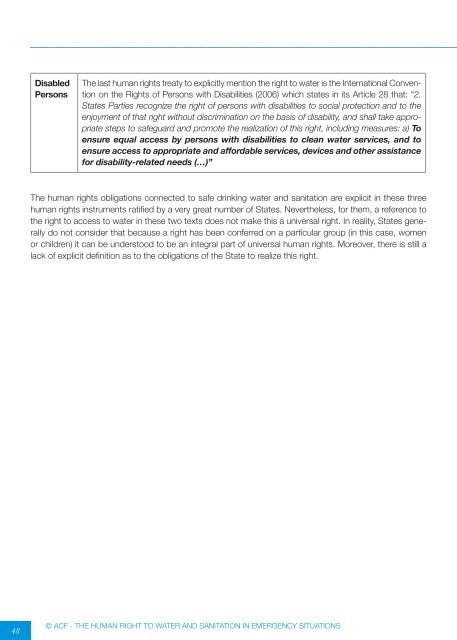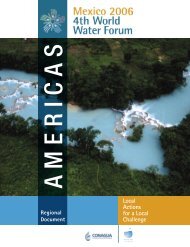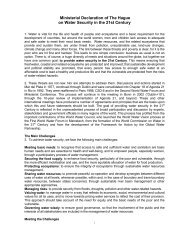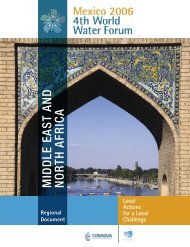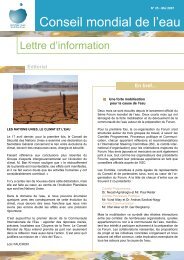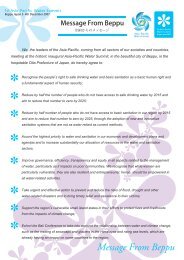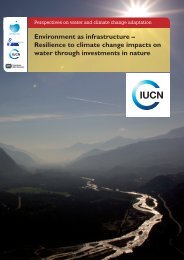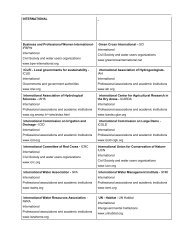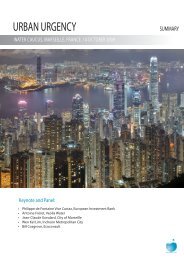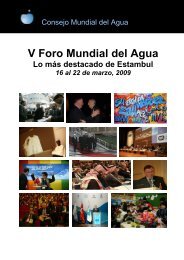the human right to water and sanitation in emergency situations
the human right to water and sanitation in emergency situations
the human right to water and sanitation in emergency situations
Create successful ePaper yourself
Turn your PDF publications into a flip-book with our unique Google optimized e-Paper software.
48<br />
Disabled<br />
Persons<br />
The last <strong>human</strong> <strong>right</strong>s treaty <strong>to</strong> explicitly mention <strong>the</strong> <strong>right</strong> <strong>to</strong> <strong>water</strong> is <strong>the</strong> International Convention<br />
on <strong>the</strong> Rights of Persons with Disabilities (2006) which states <strong>in</strong> its Article 28 that: “2.<br />
States Parties recognize <strong>the</strong> <strong>right</strong> of persons with disabilities <strong>to</strong> social protection <strong>and</strong> <strong>to</strong> <strong>the</strong><br />
enjoyment of that <strong>right</strong> without discrim<strong>in</strong>ation on <strong>the</strong> basis of disability, <strong>and</strong> shall take appropriate<br />
steps <strong>to</strong> safeguard <strong>and</strong> promote <strong>the</strong> realization of this <strong>right</strong>, <strong>in</strong>clud<strong>in</strong>g measures: a) To<br />
ensure equal access by persons with disabilities <strong>to</strong> clean <strong>water</strong> services, <strong>and</strong> <strong>to</strong><br />
ensure access <strong>to</strong> appropriate <strong>and</strong> affordable services, devices <strong>and</strong> o<strong>the</strong>r assistance<br />
for disability-related needs (…)”<br />
The <strong>human</strong> <strong>right</strong>s obligations connected <strong>to</strong> safe dr<strong>in</strong>k<strong>in</strong>g <strong>water</strong> <strong>and</strong> <strong>sanitation</strong> are explicit <strong>in</strong> <strong>the</strong>se three<br />
<strong>human</strong> <strong>right</strong>s <strong>in</strong>struments ratified by a very great number of States. Never<strong>the</strong>less, for <strong>the</strong>m, a reference <strong>to</strong><br />
<strong>the</strong> <strong>right</strong> <strong>to</strong> access <strong>to</strong> <strong>water</strong> <strong>in</strong> <strong>the</strong>se two texts does not make this a universal <strong>right</strong>. In reality, States generally<br />
do not consider that because a <strong>right</strong> has been conferred on a particular group (<strong>in</strong> this case, women<br />
or children) it can be unders<strong>to</strong>od <strong>to</strong> be an <strong>in</strong>tegral part of universal <strong>human</strong> <strong>right</strong>s. Moreover, <strong>the</strong>re is still a<br />
lack of explicit def<strong>in</strong>ition as <strong>to</strong> <strong>the</strong> obligations of <strong>the</strong> State <strong>to</strong> realize this <strong>right</strong>.<br />
© ACF - THE HUMAN RIGHT TO WATER AND SANITATION IN EMERGENCY SITUATIONS


